PESHAWAR: Hajji Asmat, 55, migrated to Pakistan in 1985, leaving behind a prosperous life in Afghanistan’s city of Baghlan.
His father was a landlord who ran a well-established business in the area. After the Soviet invasion, the family moved to Peshawar in Pakistan.
“It was a horrible time for my family, both mentally and financially,” Asmat told Arab News. Like other Afghans, Asmat’s family also started building a new life from scratch in a refugee camp.
After a decade of hard work, Asmat succeeded in his clothing business in Peshawar Board Bazaar.
The bustling marketplace was once described as mini-Kabul since it used to be the hub of Afghan refugees with entrepreneurial skills — until recently. Last year, the Pak-Afghan border was shut down by Pakistani authorities owing to clashes which created an outcry against the Afghan community on the eastern side of the border. The Pakistani government then formally sought their repatriation.
Currently, 1.4 million Afghan refugees live in Pakistan while 4.3 million have gone back to Afghanistan since 2002 under the UNHCR-supported voluntary repatriation program.
The government of Pakistan has also registered around 800,000 undocumented Afghans. “In 2016, 380,000 and last year 60,000 Afghan refugees went back to their country,” UNCHR spokesperson Qaiser Khan Afridi told Arab News.
Pakistan’s demand that Afghan refugees pack up their belongings and businesses in two months has disturbed Asmat and dozens of other Afghan businessmen. “We have receivables amounting to millions of rupees,” he said. “It is not possible to get that kind of money in haste.”
Owing to the protracted conflict in Afghanistan, Asmat’s home in Baghlan has also been razed and he will have to construct it again. When the property dealers learn about the repatriation, the worth of his property drops in Pakistan. As he sees it, there are “mafias on both sides of the border who are trying to financially benefit from the situation.”
“Afghans want to go back to their home,” said Saeed Khan, a businessman from the war-ravaged country who regularly visits Pakistan. “But they need some time for that.”
Khan has a valid visa on his passport, though he still faces problems while dealing with state agencies.
“This visa makes me lawful in this country,” he said, displaying his travel permit. “But I am still alien and illegal for local police and other agencies.”
“In the past police have arrested only the unregistered Afghans but once the registration and other processes started all arrests were stopped,” said Salahudin Mehsud, Northwest province Khyber Pakhtunkhwa’s Inspector General of Police in response to allegations.
Amina, an Afghan woman, fell in love with a Pakistani and married him. A mother of four, she now lives with her husband on the outskirts of Peshawar. All her children are studying in different educational institutes in the city.
“I am worried about my children’s future,” said Amina, visibly upset. Her elder son and daughter are 10th and 12th-grade students in local colleges.
“First, we had to put up with foreign aggression. Then the factional fighting began and, ultimately, the Taliban destroyed the infrastructure in our country. There are not many modern education facilities in Afghanistan, and I don’t want my children to remain illiterate.”
Hundreds of Afghans, males and females, are married to Pakistani citizens. The future of their relationships largely depends on how Afghanistan and Pakistan deal with each other.
Meanwhile, the UNHCR spokesperson told Arab News that the UN refugee agency has been trying to make the voluntary repatriation program convenient for the refugees by providing $200 per head to all the families who agree to go back to their country.
Afghan refugees face uncertainty in Pakistan
Afghan refugees face uncertainty in Pakistan
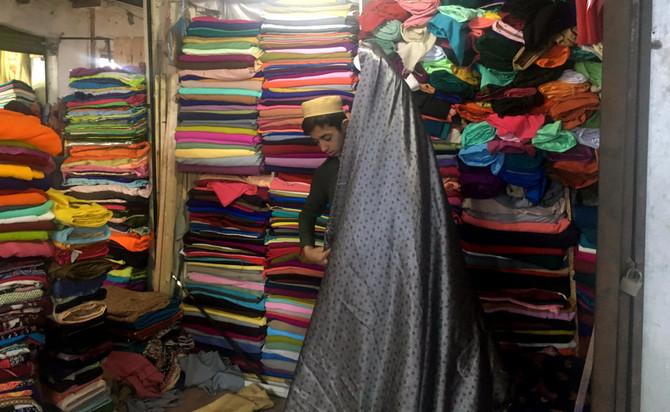
PM Sharif forms committee to address Pakistani wheat farmers’ grievances
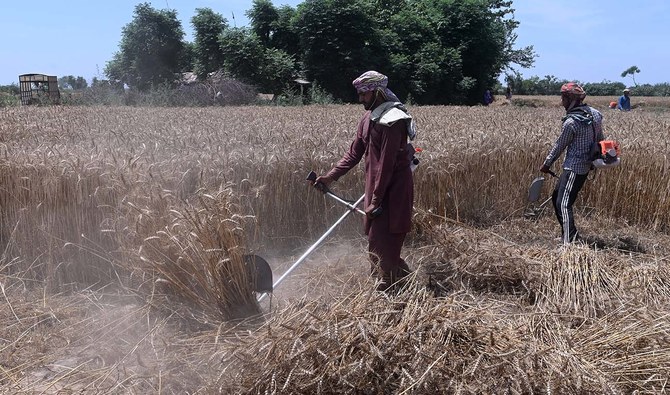
- Farmers are demanding government stop wheat imports that have flooded markets, leading to reduced prices
- Government committee to take measures to address farmers’ complaints within four days, says state media
ISLAMABAD: Prime Minister Shehbaz Sharif this week formed a government committee to address the ongoing wheat crisis in the country, state-run media said, amid protests by thousands of farmers who say they are facing difficulties in selling and buying the food grain in Pakistan.
Farmers in Pakistan’s most prosperous Punjab province are demanding the government stop wheat imports that have flooded the market at a time when they expect bumper crops. The import of wheat in the second half of 2023 and the first three months of 2024 has resulted in excess amounts of the commodity leading to reduced prices, they say.
“Prime Minister Shehbaz Sharif on Saturday taking notice of the issues faced by the farmers in selling their wheat and obtaining wheat bags, formed a committee under Ministry of National Food Security and Research to address their grievances,” the state-run Associated Press of Pakistan (APP) reported.
Sharif issued the directives to form the committee during a high-level meeting he chaired on Saturday to review wheat procurement matters through the Pakistan Agricultural Storage and Services Corporation (PASSCO). The meeting was attended by federal ministers Rana Tanveer Hussain, Attaullah Tarar, and other officials.
The committee would take measures to address farmers’ concerns within four days, APP said, adding that Sharif expressed concerns over reports of farmers facing difficulties in buying wheat at “fair” prices and tasked authorities to resolve the issue immediately.
“The federal government, through PASSCO, is procuring 1.8 million metric tons of wheat to ensure maximum benefit to farmers,” the APP quoted Sharif as saying.
“The prime minister emphasized that the government will not compromise on the economic protection of farmers and will take all necessary steps to ensure their well-being.”
Agriculture is the backbone of Pakistan’s economy and constitutes its largest sector. The majority of Pakistan’s population, directly or indirectly, depends on agriculture for their income.
According to the Pakistan Bureau of Statistics (PBS), agriculture contributes about 24 percent of the Gross Domestic Product (GDP) and accounts for half of the employed labor force in the country.
Pakistan face Korea in Azlan Shah field hockey tournament today

- Pakistan began tournament on winning note after beating Malaysia 5-4 on Saturday
- The 30th edition of the prestigious tournament is being played in Malaysia’s Ipoh city
ISLAMABAD: Pakistan will face Korea in the Sultan Azlan Shah field hockey cup today, Sunday, after beginning the tournament on a winning note a day earlier by beating hosts Malaysia, state-run media reported.
The 30th edition of the prestigious field hockey tournament is being played in Ipoh, Malaysia from 4-11 May. The cup will be contested between six teams, namely Canada, Japan, Malaysia, New Zealand, Pakistan and Korea.
Pakistan’s national hockey team made a triumphant start to the tournament on Saturday, defeating hosts Malaysia by 5-4 in a thrilling match.
“The Pakistan hockey team would face Korea in their second match on Sunday (May 5),” state-run media Associated Press of Pakistan (APP) reported.
Pakistan have the upper hand against Korea as far as the head-to-head record is concerned. The South Asian country has won 14 matches in total against Korea while the latter has won eight. Both teams have drawn with each other six times.
Pakistan’s hockey team came from behind on Saturday to down Malaysia 5-4 to win the contest. Sufiyan Khan, Pakistan’s drag flicker, scored a hat-trick while Zakriya Hayat and Abu Bakar Mahmood contributed one goal each to the team’s victory.
The Sultan Azlan Shah Cup 2024 will see a round-robin stage at first where all six teams will play each other once, followed by positional playoffs.
The teams finishing in the bottom two places of the league stage will contest in a fifth-place classification match. Teams finishing in third and fourth place in the pool stage will compete for bronze, while the top two teams will play in the final for the title.
The match is scheduled to begin at 3:15 p.m. Pakistan Standard Time (PST).
Saudi business delegation to arrive in Pakistan today to explore investment opportunities
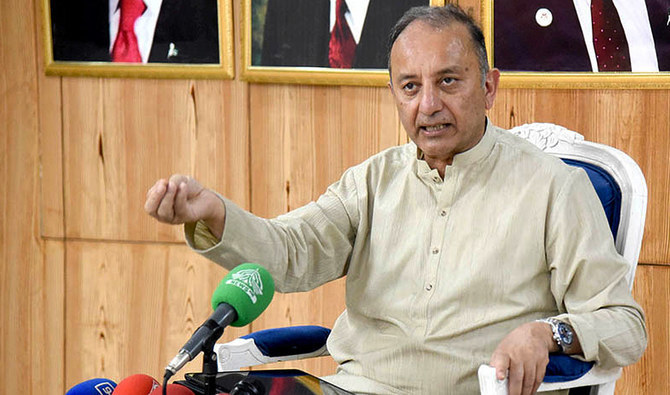
- Saudi deputy investment minister, representatives of 30-35 Saudi companies part of delegation, says Pakistani minister
- Saudi Arabia recently reaffirmed its commitment to expedite investment package for Pakistan worth $5 billion
ISLAMABAD: A high-level Saudi business delegation led by the Kingdom’s deputy investment minister will arrive in Pakistan today, Sunday, to explore investment opportunities in various economic sectors, Federal Minister for Petroleum Musadik Malik confirmed a day earlier.
Pakistan and Saudi Arabia, who enjoy fraternal ties rooted deep in shared culture, religion and economic cooperation, have witnessed a flurry of official visits in recent weeks. Saudi Foreign Minister Prince Faisal bin Farhan traveled to Islamabad earlier in April before Prime Minister Shehbaz Sharif’s two-day visit to the Kingdom to attend a World Economic Forum meeting where he met Saudi officials.
“The Saudi Deputy Investment Minister is visiting Pakistan tomorrow,” Malik, who is also the focal person for Saudi-Pak bilateral collaboration, told reporters at a news conference in Lahore on Saturday.
“He is bringing representatives from 30 to 35 companies whose CEOs are coming here.”
The Pakistani minister maintained his country had always cherished cordial ties with the Kingdom, though it had not managed to turn this “relationship of friendship into a relationship of stability and progress.”
He said Pakistan mostly discussed its financial concerns with the Saudi authorities and requested their support. However, the present government wanted to change that by focusing its bilateral conversations on mutually beneficial progress and development, not aid and assistance.
The minister said the two sides discussed a new refinery project during the recent engagements that would be used for export purposes to earn foreign revenue. Additionally, food security was also discussed to further strengthen Pakistan’s agricultural sector.
He informed that Prime Minister Sharif wanted the country’s “private sector to take the lead on this path to progress.”
“That is why Saudi investors have been invited to come here,” he continued. “They will sit with Pakistani companies and figure out ways to connect the Pakistani talent with the capital and investment needed at the international level for the IT revolution.”
Malik said the bilateral collaboration would primarily benefit small businesses, particularly the technology companies established by young students who were likely to get a significant amount of investment from Saudi entrepreneurs.
He expressed optimism that chemical, energy and agricultural companies would also gain an advantage from the ongoing bilateral collaboration between the two sides.
Apart from Pakistan and Saudi Arabia’s fraternal ties, the Kingdom is particularly important to Islamabad as it is home to over 2.7 million Pakistani expatriates and serves as the top source of remittances to the cash-strapped South Asian country.
Both Pakistan and Saudi Arabia have been closely working to increase bilateral trade and investment deals, and the Kingdom recently reaffirmed its commitment to expedite an investment package worth $5 billion.
Pakistan urges Hajj pilgrims to get vaccinated five days before departure to Saudi Arabia
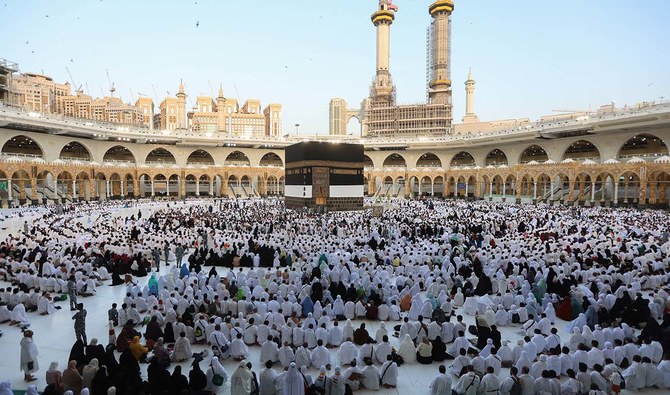
- Pakistani pilgrims require to vaccinate themselves against meningitis, seasonal influenza and polio
- The vaccinations are done at Hajji camps during the day in all major cities around the country
ISLAMABAD: Pakistan’s religious affairs ministry on Saturday asked Hajj pilgrims to get themselves vaccinated at least five days before departure to Saudi Arabia to avoid inconvenience.
Hajj pilgrims must comply with strict vaccination requirements set by the Saudi Ministry of Health to ensure public safety during one of the world’s largest annual gatherings.
Mandatory vaccines include the meningitis shot, with additional recommendations for the seasonal influenza vaccine, while travelers from regions prone to yellow fever and polio must also provide corresponding immunization certificates.
These precautions are vital to prevent the spread of infectious diseases among millions of pilgrims converging in the kingdom from across the globe.
“The intending pilgrims are advised to visit their respective Hajji camps five days (from 9 am to 5 pm) before their flight to receive vaccination against meningitis, seasonal influenza and polio, besides obtaining a yellow card,” the state-owned Associated Press of Pakistan (APP) news agency quoted a statement issued by the ministry.
“This is a mandatory requirement,” it added.
Hajj is one of the Five Pillars of Islam, which include the core beliefs and practices every Muslim is expected to follow.
The pilgrimage is required to be performed at least once in a lifetime by all adult Muslims who meet the necessary conditions of health and financial stability to travel to and perform the rituals in Makkah.
Pakistan plans to launch the special Hajj flight operation from May 9 that will continue until June 10.
Security forces kill six militants in northwest Pakistan
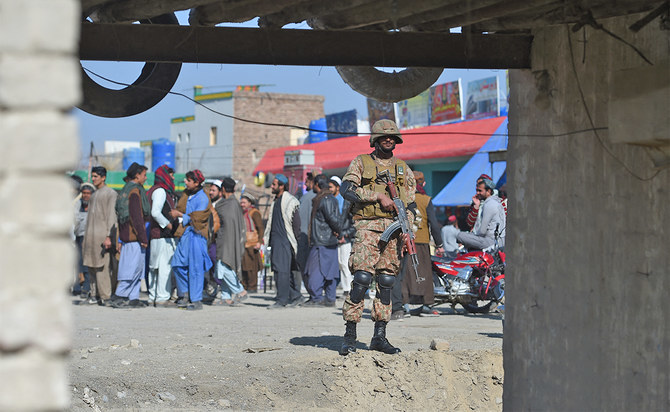
- The intelligence-based operation was carried out in North Waziristan that led to an intense exchange of fire
- The targeted militants were involved in violent attacks against security forces and civilians in the volatile area
ISLAMABAD: Pakistani security forces carried out an intelligence-based operation in North Waziristan tribal district in the early hours of Saturday, killing six militants after a heavy exchange of fire.
Located in the tribal belt along the Pakistan-Afghanistan border, North Waziristan has historically been known as a volatile region with significant militant activity.
The Pakistani military carried out several major operations in the area to dismantle militant networks and had success in reducing violence.
However, there have been reports of renewed militant activities in the region, prompting the Pakistani security forces to once again increase its focus on these challenges.
“On night 3/4 May 2024, security forces conducted an intelligence based operation in North Waziristan District, on reported presence of terrorists,” the military’s media wing, ISPR, said in a statement.
“During the conduct of operation, intense fire exchange took place between own troops and the terrorists,” it continued, adding that six militants were killed as a result.
The statement informed that the security forces also destroyed militant hideout during the operation and launched a “sanitization operation” in the area while trying to locate any remnants of the militant group.
“The killed terrorists remained actively involved in numerous terrorist activities against security forces as well as target killings of innocent civilians in the area,” the ISPR added.





















